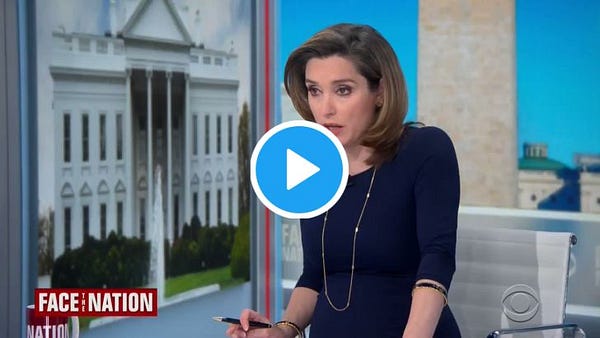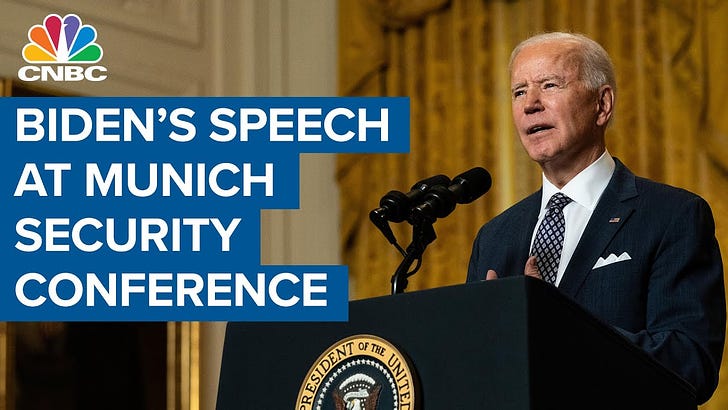At first blush, you’d think it was good news that the Biden administration has expressed its willingness to meet with Iranian and European reps in Europe to discuss resurrecting the Iran deal from the dead. American policy on Iran since 2017 has been incoherent, costly, strategically ineffective, and greatly undermined the much needed shift of resources to the Asia-Pacific first begun by the Obama administration, but kneecapped by Republican sequestration cuts, Sanders and Warren’s successful war on reason regarding the TPP and TTIP in the Democratic Party, and Obama’s focus on burden-sharing. And now it’s panic about what Republicans think on the Hill that’s hamstrung any effort at diplomacy, even with the apparent progress.
It’s leaked that Biden’s staff aren’t even in agreement as to whether the deal can be saved. I’ve always stressed that it can’t be because doing so requires unilateral action that no president worried about his party’s future would pursue. Per the Politico reporting:
“Three of the people, however, noted that Brett McGurk, a senior Middle East official on the National Security Council staff, is among the more hawkish voices on Iran – and that national security adviser Jake Sullivan at times takes a harder line than many of his colleagues.”
Biden’s superpower has always been to appear to be at the very center of the Democratic Party and an erstwhile consensus builder in that vein. The problem is that the center of the party was always in agreement with Trump that the Iran deal was bad. Why? There’s no such thing as perfect. The criticisms over the Saudi role in Yemen, when coming from more center left senators and figures like Chris Murphy who were hoping (foolishly) to eclipse NJ Senator Bob Menendez by throwing the public a bone, were largely a fig leaf. Murphy had no intention of challenging consensus policy on Syria, for instance, despite the fact that it had become effectively interlinked with the Iran deal negotiations as Israel has been ramping up strikes on Iranian targets for years now while acting against the nuclear program in a fashion that was ultimately meant to be taken as a clear signal and warning that more would follow if need be. From the outset of Biden’s brief venture hoping to save Transatlanticism from its discontents, his own government is divided on the best course of action. It is crucial once more to stress that Secretary of State Tony Blinken’s comments about Iran’s break-out time to a nuclear weapon were considerably gloomier than Israeli intelligence. Biden’s remarks are here in this video if you’re curious for a full picture:
The topline themes are obvious. America, the drunken lout who was too rich, too powerful, too cloying to be ignored when Trump acted unilaterally, is back. Happy days are here again. The democracies of the Atlantic and Pacific will band together once more and get the job done. It’s nice fluff and feeds the leit motif of Democracy vs. Authoritarianism that feeds many an NGO and think tank in need of budget money. Most important was his explicit claim — directly mind you in the face of Trump and traditional Republican policy — that:
“We can own the race for the future. But to do so, we have to be clear-eyed about the historic investments and partnerships that this will require. We have to protect — we have to protect for space for innovation, for intellectual property, and the creative genius that thrives with the free exchange of ideas in open, democratic societies. We have to ensure that the benefits of growth are shared broadly and equitably, not just by a few.”
Fighting wealth inequality is a matter of preserving the international system of alliances and dependencies Biden is invoking. It speaks to how much he links domestic aims to the international arena. We still have to see what he can achieve on that front, but I think it’s a rhetorical shift that’s here to stay, and one that points to the internal contradictions of an age of unfettered capital and the hope for strategic autonomy in key areas of trade. In a more traditional vein, Biden put both China and Russia on notice. But you can tell that his line about Russia being the biggest security threat the country faced while still campaigning for the presidency — clearly red meat for center left and center right, liberal minded or leaning voters they wanted to turn out in the suburbs — has been replaced by an explicit recognition that China is a much more comprehensive challenge, whereas Russia is primarily a regional one about Europe.
“We can own the race for the future. But to do so, we have to be clear-eyed about the historic investments and partnerships that this will require. We have to protect — we have to protect for space for innovation, for intellectual property, and the creative genius that thrives with the free exchange of ideas in open, democratic societies. We have to ensure that the benefits of growth are shared broadly and equitably, not just by a few.”
It’s a speech very short on substance, but I’d argue that Biden’s injunction to act is predicated primarily on the grounds of political economy between states. I’m really curious to see how that pans out the next few months cause related security and foreign policy moves that happened after the speech speak to a president who’s willing to go over the heads of his advisers if he disagrees, but one who doesn’t appear to have any coherent ‘doctrine’, but rather will be prone to policy entrepreneurship that plays on his affective inclinations as a leader. Iran policy is the biggest crucible out the gate, and we still have no idea what his administration really intends to do.
It was very welcome news that Biden unilaterally rescinded the Trump administration’s re-application of UN sanctions on Iran from September back when Trump and Pompeo were just trying to stir the pot before the election to tie everyone’s hands on the matter. By all appearances, it suggested Biden was not listening to his more hawkish advisers, including Jake Sullivan — Washington’s own man without a face — and Brett McGurk — someone likelier to take a hard line because of his experience as the special envoy on Syria who Trump ignored (he quit after the nonsense about US withdrawal blew up). It’s probably a tell when an advisor decides Trump is too weak on Syria and then, just a few months later, the president literally authorizes the assassination of Iran’s highest ranked military official. Anyway, the other comments from European leaders at Munich and Jake Sullivan on TV don’t suggest a breakthrough:


Pre Munich, Merkel was saying that ‘positive signals’ were needed to save the deal i.e. Iran had to give something. Macron shamelessly tried to insert himself as an ‘honest broker’ for talks after showing that Paris wanted Saudi Arabia and Israel to be involved in further negotiations, which was immediately brushed off by Tehran. Boris Johnson is, well, Boris Johnson. And Iran has stopped snap inspections of its nuclear facilities by IAEA, but still allows access to keep talks going. Reaching a deal is about brinksmanship. Trump knew it and folded when Bolton worked his magic in service to the Saudis and Emiratis to set him up with the drone that was shot down. He blinked. We’re all lucky for it, though Soleimani’s death was an absolutely insane decision for policy. Biden is going to have to give more unilaterally, which very quickly will be spun as him looking weak no thanks to his own advisers briefing the media in such a way as to lay that PR trap.
The decision to increase the NATO deployment to Iraq from 500 to 4,000 after rocket attacks hit a base in Erbil, Iraqi Kurdistan and one north of Baghdad reeks of the self-licking ice cream cone fallacy. Troops are deployed, then they’re in danger, so more have to be deployed to ensure their security ad infinitum. Increasing deployments to Iraq is a signal to Tehran that Europe is bought into the US approach, no matter what it ends up being. Once you put coalition forces on the ground in greater numbers to secure facilities without pulling anything back out of Syria, you’re re-emphasizing that an attack on one is an attack on all — something Biden made sure to stress — and also expanding the scope for mission creep. Biden has no strategy when it comes to Afghanistan — we’re not leaving, at least per the present policy course — and there’s no compelling rationale for larger deployments to Iraq — ISIS was never even a threat to the homeland or Europe on a sustainable basis to begin with and now is irrelevant.
China’s now calling for a reset in US-China relations in what’s transparently a reaction to the fact that Biden has instilled the appearance of more unity in Europe than they expected and US sanctions on China Inc.’s access to key tech are beginning to bite as semiconductor shortages emerge in different sectors globally. Munich was a nice piece of theater for the Biden administration, a cheap way to create the appearance of momentum, resolve, and competence after 4 years of incoherence. Washington wonks can use their stable of inappropriate and grating metaphors and comparisons to describe how much better everything is all of a sudden now that administration hands are listening to them again.
America is back! The next problem will inevitably be how the US plays its hand when Europe’s recovery stalls (at least at the current rate). It continues to fascinate me how the majority of the perceived decline of American power in global affairs is actually about the decline of European power and fact that the US has long been able to rely on it to serve its purpose geopolitically, a prospect greatly challenged by the structural sources of inequality in the United States connected to its international role. Reporters will pen many a headline for another month or two about Biden breaking with Trump despite the lack of evidence that much of what’s happening is really a break from anything. Until we see how far Biden is willing to stake his reputation with Congress by acting unilaterally to advance negotiations with Iran, we have no way of knowing how true that break is.
My money’s on the process stalling out. Europe has bigger problems at home and after Borrell’s disastrous trip to Moscow, it’s going to take US action to make mediation efforts credible. German foreign minister Heiko Mass noted that Iran’s been “playing with fire” and using escalation to force people to the table. Even though Merkel seems to have been able to open the dialogue between the Americans and Iranians, the next stage will be Iran’s efforts to unfreeze money in South Korea and Japan to buy vaccines to back channel to Washington. Germany cannot credibly remain the arbiter and broker if its own policy preferences are to castigate Iran as an instigator when it was the US that unilaterally left the deal. I have no idea how Biden’s going to play that, and the joint naval exercises between Russia and Iran last week were undoubtedly picked up by figures like Sullivan to argue for more pressure. Perception isn’t always reality when it comes to international affairs, something Joe Biden’s well aware of that fact. Things look better at the moment. It could all fall apart very quickly.
Like what you read? Pass it around to your friends! If anyone you know is a student or professor and is interested, hit me up at @ntrickett16 on Twitter or email me at nbtrickett@gmail.com and I’ll forward a link for an academic discount (edu accounts only!).



